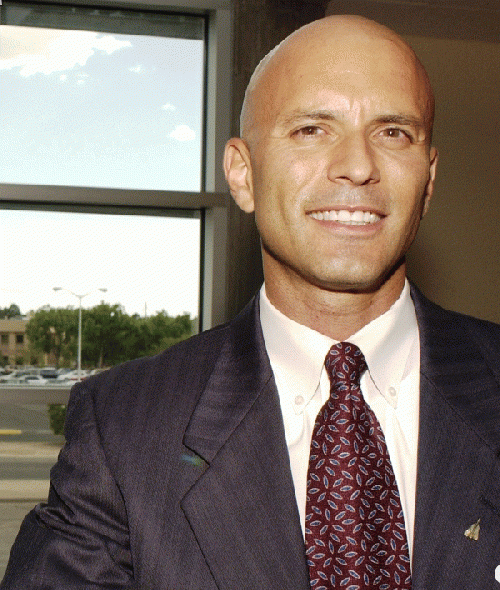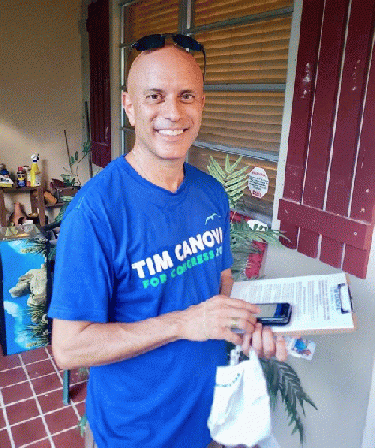Tim Canova "Won't Back Down" Against DWS

Tim Canova is a Professor of Law and Public Finance at the Nova Southeastern University Shepard Broad College of Law in Davie/Ft. Lauderdale, Florida.
(Image by courtesy of Tim Canova) Details DMCA
My guest today is Tim Canova, a progressive lawyer and law professor. Tim challenged the powerful Hillary supporter and DNC chair, Representative Debbie Wasserman Schultz, in the 2016 Democratic primary for Florida's 23rd congressional district.
Joan Brunwasser: Welcome to OpEdNews, Tim. You have a very interesting story to share with our readers. Let's start with how you came to be in that race.
Tim Canova: In the spring of 2015, I tried to contact my local congresswoman's office to share my expertise and criticism of the proposed Trans-Pacific Partnership (TPP). Although I'm a tenured law professor at the only law school in Debbie Wasserman Schultz's district, and with years of experience researching and writing about trade agreements, my repeated attempts to discuss the TPP with her staff were rebuffed. I soon learned that if you don't have a check for $5,000 from a PAC to donate to Wasserman Schultz, good luck getting any response from her staff. I ended up joining protests organized by the Citizens Trade Campaign (CTC) outside of her district office in Pembroke Pines.
Those protests also proved unsuccessful as Wasserman Schultz became the only Democrat in Florida's House delegation to vote to fast-track the TPP. Our research showed that she had taken more than $330,000 from corporate interests lobbying on behalf of the TPP. Further research showed this was a pattern. She's been taking millions of dollars from big Wall Street banks, payday lenders, big pharmaceutical companies and private insurers, the fossil fuels industry, Big Sugar and factory farms, private prisons -- and many more of the most predatory corporate interests in the world.
Along with friends at the CTC, we started to look for someone to challenge Wasserman Schultz in a Democratic primary. It's a safe Democratic seat, so if there's no primary challenge, there's no accountability. Since Wasserman Schultz was then the chair of the Democratic National Committee, we were unable to find any politician in Florida willing to challenge her. By then, I was supporting Senator Bernie Sanders' presidential campaign and inspired by his call to action. I got caught up in the moment and decided to challenge Wasserman Schultz in early 2016, less than eight months before the August 30, 2016 Democratic primary.
JB: Was this a rather casual, last-minute decision? Did you have any experience running a campaign or being a candidate?
TC: This was not a casual, last-minute decision. Over the years, I had volunteered and served as an advisor on several campaigns, including campaigns for Congress and the Senate. I had also served as a legislative aide on Capitol Hill for the late U.S. Senator Paul Tsongas, a Democrat from Massachusetts. As a law professor and activist, I continued with writing and advocacy on political and economic issues, including as part of the Occupy Wall Street movement.
JB: Were you concerned that, facing an establishment Democrat with strong backing, and coming in so late in the race, that you were facing impossible odds? Or was winning not the point?
TC: I was not running in 2016 to make a statement, I was running to win. I understood the odds were against me, but I always believed we could and would win. Even before I jumped into the race, I realized that the campaign would go viral, that we would raise a lot of money online in small donations, and that the issues would be on our side.
JB: And is that, in fact, what happened? How did you go viral? If it were so easy, everyone would do it.
TC: No, it was not easy. We tried to recruit someone to challenge Wasserman Schultz, we tried to find an elected official, an experienced politician. No one was interested, because she was the chair of the Democratic National Committee at the time. That's not an easy race to jump into. I was up against a powerful and corrupt political machine, a mainstream corporate media that's in Wasserman Schultz's pocket, and a Democratic establishment that tried to block me every step of the way. But I also knew I was in step with the American people and the grassroots of the progressive movement that was sweeping the country. I announced my candidacy in early January 2016 and immediately hit Wasserman Schultz for rigging the DNC against Bernie Sanders, for raising millions of dollars from huge Wall Street banks and predatory corporate interests, and for her lackluster record in Congress. We got our message out on social media and our campaign picked up steam from the beginning. It went viral and raised a million dollars in the first three months, before Bernie Sanders surprised us with an endorsement.

Tim campaigning door-to-door in Florida's 23rd Congressional District in the summer of 2018.
(Image by courtesy of Tim Canova) Details DMCA
JB: Wow! Then what? How did the campaign proceed? At what point did DWS start to take you and your candidacy seriously?
TC: We were on the attack every day during the campaign, highlighting the hypocrisy of Wasserman Schultz's actual record, which was quite contrary to how she was portraying herself. I'm not sure when she started to take us seriously. She did all she could to marginalize us in local Democratic Party circles.
(Note: You can view every article as one long page if you sign up as an Advocate Member, or higher).





